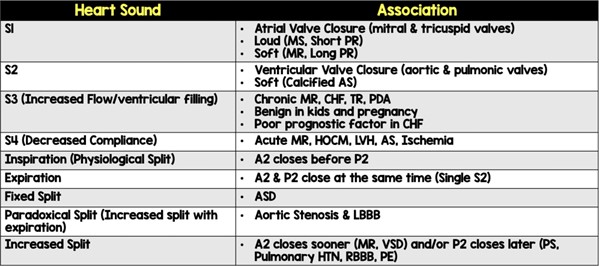The practical nurse (PN) is auscultating a client's heart sounds. Which abnormal heart sound should the PN report to the charge nurse? (Please listen to the audio file to select the option that applies.)
S4.
S2.
S1.
S3.
Correct Answer : A,D
S3 is an extra heart sound that occurs during diastole (the filling phase of the cardiac cycle). It is commonly associated with conditions such as heart failure and volume overload. S3 is often described as a low-frequency, dull, and distant sound heard after S2 (the second heart sound).
B, C- S1, and S2 are the normal heart sounds that are typically heard in all individuals. S1 is the first heart sound, heard as "lub," and is caused by the closure of the mitral and tricuspid valves. S2 is the second heart sound, heard as "dub," and is caused by the closure of the aortic and pulmonic valves. These sounds are normal and expected.
S4 is another abnormal heart sound, which occurs during late diastole and is associated with conditions such as ventricular hypertrophy and reduced ventricular compliance.

Nursing Test Bank
Naxlex Comprehensive Predictor Exams
Related Questions
Correct Answer is D
Explanation
While caring for a client with Guillain-Barre syndrome, the practical nurse (PN) should report the finding of irregular heart rate to the charge nurse. Guillain-Barre syndrome is a neurological disorder that can affect multiple body systems, including the autonomic nervous system.
Autonomic dysfunction can lead to various cardiovascular abnormalities, such as changes in heart rate and rhythm.
However, irregular heart rate can indicate potential cardiac involvement or autonomic instability, which requires prompt evaluation and intervention. Therefore, the PN should report the finding of an irregular heart rate to the charge nurse for further assessment and appropriate management.
Incorrect:
A, B- Full facial flushing and profuse diaphoresis are common symptoms that can occur in Guillain-Barre syndrome due to autonomic dysfunction. While these findings should be noted and monitored, they may not require immediate reporting unless they are severe or accompanied by other concerning symptoms.
C- Lower leg weakness is a characteristic symptom of Guillain-Barre syndrome and is expected in this condition. The PN should document and monitor the extent and progression of weakness but does not necessarily need to report it unless there are significant changes or complications.
Correct Answer is D
Explanation
When a client expresses fear and uncertainty about undergoing surgery, it is important for the practical nurse (PN) to communicate this information to the charge nurse or the healthcare provider. By notifying the appropriate person, the PN ensures that the client's concerns are addressed and appropriate interventions can be implemented.
Options a) and c) are not the priority actions because documenting the client's concerns or reminding them about the signed consent does not address their emotional needs or provide support.
Option b) may not be the most appropriate response, as simply encouraging the client to continue with the scheduled surgery without addressing their fears and uncertainties may not be sufficient to alleviate their anxiety.
Therefore, the best course of action is to notify the charge nurse or healthcare provider so that they can assess the client's concerns, provide reassurance, and address any questions or fears the client may have prior to the surgery.
Whether you are a student looking to ace your exams or a practicing nurse seeking to enhance your expertise , our nursing education contents will empower you with the confidence and competence to make a difference in the lives of patients and become a respected leader in the healthcare field.
Visit Naxlex, invest in your future and unlock endless possibilities with our unparalleled nursing education contents today
Report Wrong Answer on the Current Question
Do you disagree with the answer? If yes, what is your expected answer? Explain.
Kindly be descriptive with the issue you are facing.
